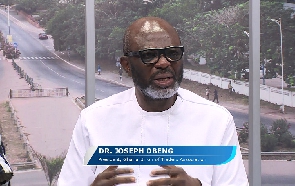- Home - News
- TWI News | TV
- Polls
- Year In Review
- News Archive
- Crime & Punishment
- Politics
- Regional
- Editorial
- Health
- Ghanaians Abroad
- Tabloid
- Africa
- Religion
- Election 2020
- Coronavirus
- News Videos | TV
- Photo Archives
- News Headlines
- Press Release
Business News of Friday, 6 December 2002
Source: newsInGhana
IMF on Ghana's economy: Part II
Total government expenditure (excluding foreign financed investment) during January – July 2002 was 9 per cent higher than budgeted. Although revenues have been performing well, net domestic financing during January – July was 24 per cent of GDP in excess of what was programmed, and the outlook for 2002 as a whole is for an overrun adjustment measures are not taken.
There are several contributing factors: A reported overrun in the wage bill, the bulk of which appears to relate to salary hikes in the education sector… and which is indicative of a breakdown in the expenditure control-system.
Higher than programmed subsidies to the public utilities, reflecting the delay in adjusting utility tariffs and a deterioration in the cost base of the Volta River Authority.
Non-implementation of the VAT increase planned for mid-2002. Delays in executing the fast track divestiture plan, from which US$30million in proceeds had been adjusted as world crude prices have risen and the cedi depreciated over the past six months or so. This has resulted in a rapid accumulation of new bank debt at the Tema Oil Refinery (TOR). TOR’s short-term debt has risen by around ?800 billion (1.8 per cent of GDP) since the beginning of 2002, virtually eliminating the benefit of last year’s debt restructuring.
There is now the prospect of the government having to assume at least a further ?1.6 trillion of TOR’s debt that the refinery cannot afford to service itself, imposing a significant additional burden on the budget in 2003.
Urgent Measures
There are two areas where action is needed as a matter of the highest priority: namely, public expenditure control and petroleum price adjustment. As regards public expenditure we would propose the following steps:First, the system of direct debits, which has hampered the monitoring and, control of expenditure since late 2001, should be abolished with effect from October 1, 2002 henceforth, all government payments should be made by treasury check.
Second, the hands-off policy with regard to enforcement of the ceiling on Interim expenditures should be terminated immediately.
We understand the special difficulties in imposing spending limits on wages, but some discipline from the center is essential. We suggest that for the fourth quarter of 2002, a set of ceiling is devised for Item 1 expenditure by M2DA that allows for payment only of time estimated base salaries, plus perhaps some modest margin for properly authorized allowances.
The CAGD should be given the political authority and mandate to enforce these limits rigidly. This regime should be maintained into next year.
Thirdly, the government should seek to identify expenditure savings that could be made on the administrative or capital budgets in the fourth quarter of 2002, provided that such savings are made at the commitment stage and do not merely generate arrears that would have to be cleared in 2003.
Fourth, the ministry of finance, perhaps in collaboration with the Bank of Ghana, should begin preparing monthly “fiscal early warning” reports, which would be transmitted, via the EPCC, for presentation to cabinet.
These reports could be short documents that would summarise fiscal outturns in the year to date, relative to budget/program, and draw policy implications for the remainder of the year. They should cover expenditure commitments and cash outlays (synthesizing from the CAGD’s monthly reports, which should provide fully reconciled data), as well as revenue performance, and financing developments, attaching summary tables on each element. Fund staff is ready to provide feedback on advice on the format of the reports, if requested. We suggest that the first such report to be sent to cabinet by the end of October, covering fiscal developments through August 2002.
Finally, to avoid a recurrence of the problem encountered in 2001, whereby a large volume of payment vouchers were issued in the closing days of the year. We recommend that in future instructions be given that no payment vouchers be issued within two weeks of the end of the year.
With regard to petroleum prices, the ministry of energy has not shared with us their calculations of the automatic adjustment formula, but we estimate that ex-refinery prices would need to be raised by at least 30 per cent to reach current import parity levels, implying an increase in pump prices of approximately 25 per cent. Adjustment to full cost recovery (including taxes) should be made without delay in order to stem TOR’s losses, and should be combined with a reform of the pricing regime. The adjustment could be achieved in one of the two ways.
The first best solution would be to liberalise petroleum prices and imports. This would be a hugely beneficial structural reform removing a perennial source of instability in Ghana’s economy.
Second best would be to raise prices inline with automatic adjustment formula couple with a public announcement that future adjustments would be made in line with the formula on the basis of published calculations and will not be subject to official review or authorization.
We would emphasise that implementation of the formula should not be made contingent on a resolution of the controversy over TOR’s margin (the “k-factor”). The formula can be amended once this issue is settled, but in the meantime, it should ensure full pass through of movements in dollar oil prices and the cedi-dollar exchange rate.
To help contain the extent of the overrun on net domestic financing of government in 2002, efforts should be made to collect for the budget as much as possible of the proceeds from the fast track divestitures and the sales of Cocoa Processing Company (CPC) and Ghana Consolidated Diamonds (GCD) by the end of this year. We suggest that the government aims to complete the fast track divestiture programme by the end of March 2003.
To be continued.
Read PART I










